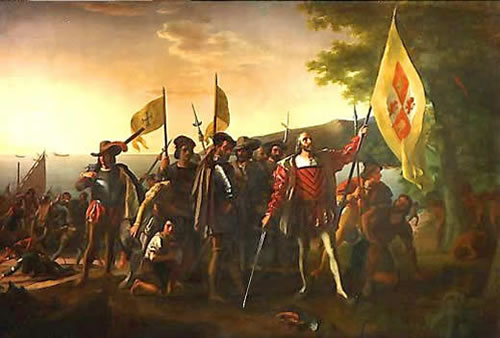|
There once was a young boy named Chris who never lost a game of hide-n-seek. After getting bored with finding his friends in the most obvious places, he reinvented the game. The new version was in the water and involved young Chris blindfolding himself to find his friends. Again, he never lost. He modified the game yet again when it was time for him to hide. After watching his friends aimless swim around for hours until they became too tired to play, he came up with an ingenious solution. The blindfolded person would yell "Marco!" and young Chris would respond with "Polo!"

Later in life, young Chris became Christopher, the great navigator and explorer. Captaining a single ship, he could map his way to any country or obscure island within seconds. He would set out and make his path via memory. However, Christopher ran into a problem when he expanded his command from a single ship into a fleet. Not every captain possessed his keen sense of direction. As Christopher set out for a destination, other captains struggled to keep up with him. For fun, Christopher would blindfold himself and attempt to make his destination on time. His captains however would get lost after the slightest storm, lack of wind, or drinking party. An admiral cannot arrive at his destination without his fleet. That is when Christopher created the most powerful navigation tool still used today: The Compass.
In 1491, Queen Isabella of Spain made a drunken bet with King George of England that the world was round. The stakes were high including a set of slaves, horses, and military favors. The next day, a sober Isabella realized she needed someone who was willing to prove her right. Christopher applied for the job and listed all this qualifications.
- Has never lost his car keys
- Once found three needles in a haystack
- Always sees the light at the end of the tunnel
- Has never had to stop and ask for directions
Queen Isabella had many qualified applicants, but only one that was born to navigate and discover. Columbus accepted the job and immediately set sail.
We know from the journals of Columbus's crew that he kept them entertained with his stories of discovering Iceland and Madagascar. When Columbus arrived at America, he discovered a new continent and the Indians. He traveled as far inland as Ohio. The Indians celebrated by naming their capitol after him.
The Indians showed Columbus the wonders of corn and turkey. In return, Columbus taught the Indians how to ride horses, build fires, and vote. Columbus did not so much discover the Indians as he helped the Indians discover themselves.
Columbus returned to Spain with several Indians who proved by their mere existence that the world was not flat. Afterward, North and South America were populated and the residents converted to Christianity. It is true that others traveled to America before Columbus, but only Columbus was able to stay.
When someone asks why we celebrate Columbus Day once a year, you tell him that it would be unfair to Martin Luther King Jr. to celebrate twice a year. |
